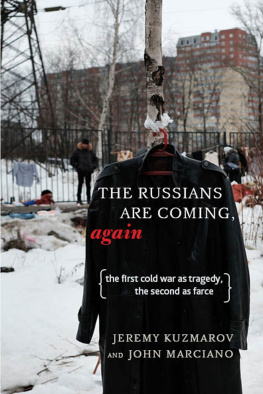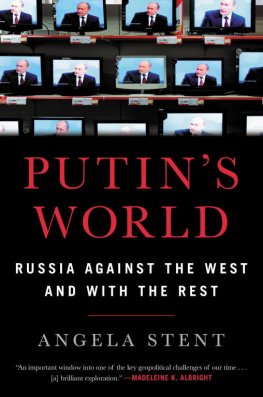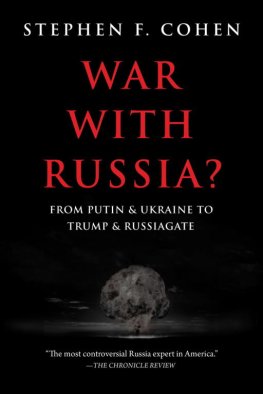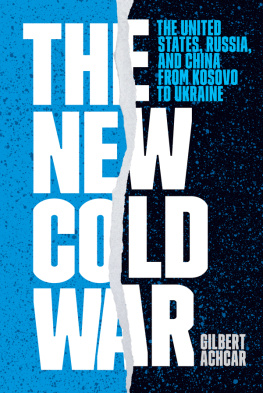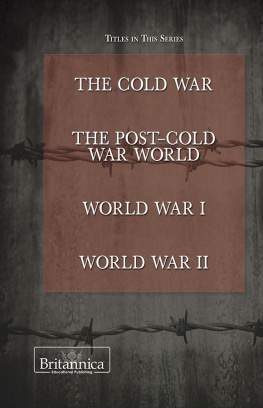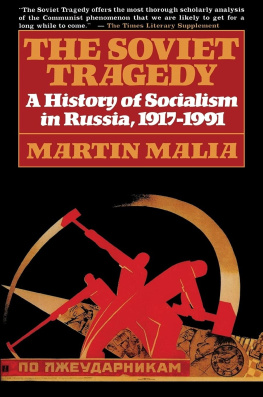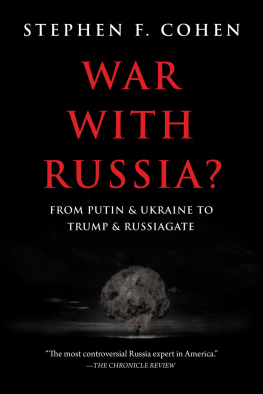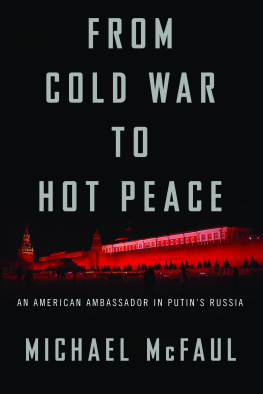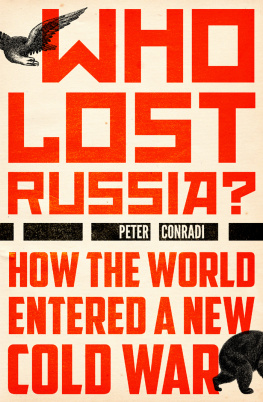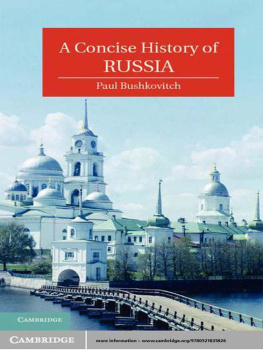
The Russians Are Coming, Again
THE RUSSIANS ARE
COMING, AGAIN
The First Cold War as Tragedy,
the Second as Farce
by JEREMY KUZMAROV and JOHN MARCIANO

MONTHLY REVIEW PRESS
New York
Copyright 2018 by Jeremy Kuzmarov and John Marciano
All Rights Reserved
Library of Congress Cataloging-in-Publication Data available from the publisher
ISBN: 978-1-58367-694-3 paper
ISBN: 978-1-58367-695-0 cloth
Typeset in Minion Pro
Monthly Review Press, New York
monthlyreview.org
5 4 3 2 1
Contents
To the millions of victims of the Cold War,
and those who have struggled valiantly for a lasting friendship
between the American and Soviet/Russian people
Acknowledgments
WE WISH TO THANK David Gibbs, Jerry Lembcke, and Michael Parenti for their careful reading and comments. Thanks also go to Philip Bennett for his reading of the manuscript; Chuck Churchill for his comradeship throughout; Michael Yates of Monthly Review Press for his editorial support and encouragement; Erin Clermont for her fine copy editing; and Leslie Dwyer, always strong, keeping her eyes on the prize. Jeremy would also like to thank the staff of the McFarlin Library at the University of Tulsa for assisting him, and to Kate Blalack and the staff at the Woody Guthrie Archive for permission to quote from Woodys songs. In addition, he thanks his lovely daughters, Chanda and Olivia, for their patience while he typed away in his office, and his wife, Ngosa, and parents. We trust that everyone mentioned will find this book worthy of their solidarity.
INTRODUCTION
The Russians Are Coming, Again
T he 1966 Academy Awardwinning film The Russians Are Coming, The Russians Are Coming, directed by Norman Jewison, parodies the Cold War paranoia pervading the United States as the war in Vietnam was heating up, depicting chaos that seizes a small coastal New England town after a Soviet submarine runs aground.
Half a century later, U.S. citizens are again being warned daily of the Russian menace, with persistent accusations of Russian aggression, lies, violations of international law, and cyber-attacks on U.S. elections, as reported in leading outlets such as the New York Times and the Washington Post.
The charges are many and relentless: the Russians invaded neighboring Georgia; the Russians attempted to subvert and overthrow the Ukrainian government; the Russians shot down Malaysian Flight MH17 in July 2014 over eastern Ukraine or supported rebel forces that did so; the Russians annexed Crimea in 2014 in an aggressive move reminiscent of the Soviet Unions postwar actions in Eastern Europe; the Russians have threatened smaller NATO nations in that region; and, most recently, the Russians engaged in cyber warfare by attempting to interfere in the U.S. presidential election and then tried to manipulate the president through connection to key figures in his inner circle.
A prime example of the new Russian hysteria comes from a 2016 report in the New York Times by national security correspondents David Sanger, Eric Schmitt, and Michael R. Gordon:
For his part, Mr. Putin is counting the days until Mr. Trump is in the Oval Office. Despite a failing economy, the Russian president has been pursuing for the past four years what most Western analysts see as a plan to reassert Russian power throughout the region. First came the annexation of Crimea and the shadow war in eastern Ukraine. Then came the deployment of nuclear-capable forces to the border of NATO countries, as Moscow, working to fracture the power structures in Germany and France and promote right-wing parties, sent a reinvigorated military force on patrol off the coasts of the Baltics and Western European nations.
Possessing some unproven assertions masquerading as fact, such as that Putin was working to fracture the power structures in France and Germany and promote right-wing parties, the article fails to acknowledge that a verbal agreement was made in late 1990 between Mikhail Gorbachev and U.S. Secretary of State James Baker. According to the Russians, whose version is corroborated by hundreds of memos and transcripts at the George H. W. Bush Presidential Library, Baker made a pledge to Gorbachev that NATO would not expand east toward their border, in return for Russian support for German reunification. Since then, of course, the United States has armed and funded NATOs eastward advance to include states that share common borders with Russia.
The United States also provocatively increased its naval presence in the Black Sea, carried out military exercises in former Warsaw Pact countries, forged ties with former Soviet republics like Azerbaijan, built oil pipelines to bypass Russia with the involvement of major Western oil companies, and covertly supported Putins opponents
In 2014, the State Department fanned protests that led to the overthrow of Ukraines semi-autocratic but democratically elected pro-Russian government, prompting the Russian annexation of Crimea, which was voted on by a 95 percent majority of Crimeans. The United States then provided over a billion dollars in security assistance to a newly installed Western-friendly right-wing regime that suppressed a pro-Russian uprising in the eastern Donbass region.
By omitting these aggressive U.S. actions, the New York Times and other media sources failed to provide proper context for many of Putins policies, hence furthering the impression that he alone is a major danger to world peace.
In summer 2016, the Obama administration announced the construction of a future U.S. missile defense site in Poland and the activation of a missile defense system in Romania.
Russia, not surprisingly, has viewed these policies with alarm, putting five new strategic nuclear missile regiments into service in 2016, intensifying development of long-range precision-guided weapons and a galaxy of surveillance drones, and stepping up support for the Bashar al-Assad government in Syria. Former secretary of defense William J. Perry is among those who believe that the danger of nuclear catastrophe stemming from the renewed arms race is greater today than during the Cold War.
As during the original Cold War, U.S. arms manufacturers have fueled the escalation by lobbying Washington and NATO to maintain high levels of military spending, aided by hired-gun think tanks and
Reversing this slide toward peace required the creation of new foreign enemies including the perception of a revived Russian imperialism, even though U.S. military spending, totaling $609 billion in 2016, dwarfs that of Russia, which spent $65 billion that year.
TRAGEDY, THEN FARCE
Karl Marx famously wrote in The Eighteenth Brumaire of Louis Bonaparte that history repeats itself first as tragedy, then as farce. If the First Cold War (19171991) was a tragedy, the Second Cold War is playing out as Marx predicted: a farce. During the First Cold War, there was at least some semblance of legitimacy in that the Soviets had infiltrated at least one verifiable spy in the Manhattan Project (Klaus Fuchs) even if the fear of domestic subversion was ultimately grossly overblown, and some aspects of the evil empire lived up to this moniker. However, in the New Cold War, the Democrats, backed by most of the media have accused Donald Trump, a U.S. capitalist original and an arch-imperialist, of being a Manchurian Candidate surrounded by disloyal agents, which is preposterous. The agents include Trumps wealthy son-in-law and his attorney general, who is a living monument to the Confederacy.
Next page
